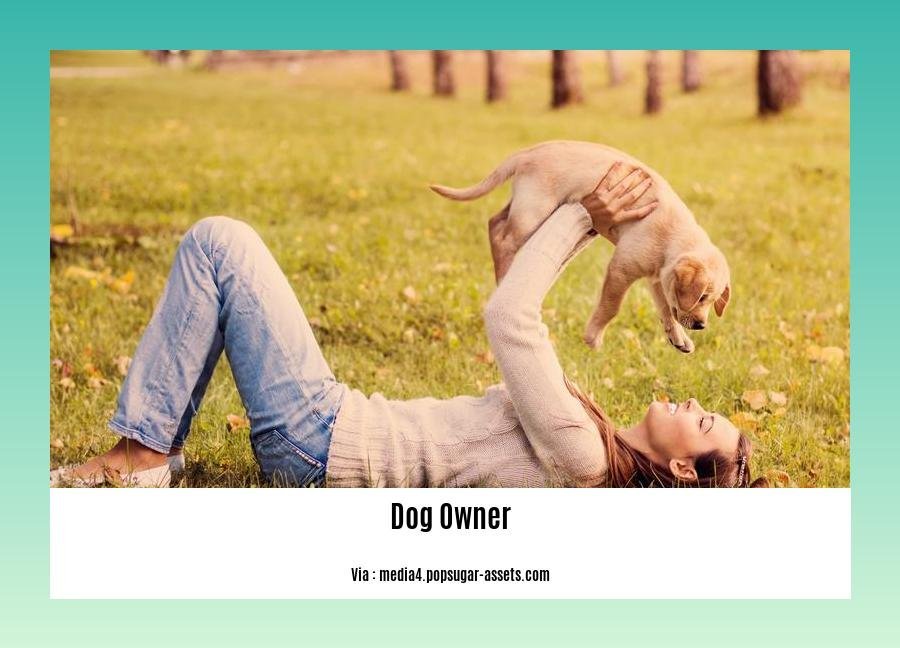Welcome to “Understanding Dog Owner Legal Responsibilities: A Guide to Responsible Pet Ownership.” As a devoted dog owner, I understand the significance of being informed about the legal obligations that come with owning a canine companion. In this article, we will delve into the essential aspects of dog owner legal responsibilities, shedding light on the crucial topics that every pet owner should be aware of. From understanding leash laws and licensing requirements to the importance of proper training and responsible behavior, this comprehensive guide aims to equip dog enthusiasts with the knowledge they need to navigate the legal landscape of dog ownership with confidence and responsibility. So, let’s delve into the world of dog owner legal responsibilities and discover the key elements that contribute to being a responsible pet owner.
Key Takeaways:
- Dog owners must protect their pets from pain, suffering, injury, and disease as mandated by the Animal Welfare Act.
- Dogs in public places should wear an external tag or collar with the owner’s name and address on it according to the Control of Dogs Order.
- Compliance with Dog Control Orders/Public Spaces Protection Orders is crucial to ensure safety in public spaces.
- The Protection of Livestock Act and Environmental Protection Act must be followed to prevent harm or damage caused by dogs.
- Vaccination against rabies is a legal requirement for all dogs to prevent the spread of the disease.
- Dogs should be kept on a leash and under the control of a responsible adult outside of the yard to avoid causing nuisance to others.
- Dog owners are responsible for picking up after their pets and minimizing excessive barking.
- Providing a suitable environment, diet, and allowing dogs to exhibit normal behavior patterns is essential under the Animal Welfare Act 2006.
By understanding and adhering to these legal responsibilities, dog owners can ensure the well-being of their pets and contribute to a safe and harmonious community.
Dog Owner Legal Responsibilities

As a responsible dog owner, it is crucial to understand and fulfill your legal responsibilities to ensure the well-being of your furry companion and the safety of others. By adhering to these legal obligations, you can promote responsible pet ownership and contribute to a harmonious community.
Protecting Animal Welfare
Under the Animal Welfare Act, it is imperative to protect your dog from pain, suffering, injury, and disease. This means providing proper care, adequate shelter, a nutritious diet, and access to veterinary care when needed. By meeting these requirements, you are ensuring the overall well-being of your beloved pet.
Identification and Control
As part of your legal responsibilities, it is essential for dogs in public places to wear an external tag or collar displaying the owner’s name and address. This identification helps reunite lost dogs with their owners and ensures accountability. Additionally, complying with Dog Control Orders or Public Spaces Protection Orders helps maintain control over dogs in public spaces and ensures the safety of the community.
Protecting Livestock and the Environment
Dogs have natural instincts, and it is crucial to keep their behavior in check to prevent harm to livestock and the environment. Complying with the Protection of Livestock Act and the Environmental Protection Act is essential to prevent any damage caused by dogs. By keeping your dog under control and preventing them from disturbing livestock or damaging the environment, you are fulfilling your legal responsibilities as a dog owner.
Vaccination and Disease Prevention
Vaccinating your dog against rabies is not only a legal requirement but also a crucial step in preventing the spread of this dangerous disease. By ensuring your dog is up to date with their vaccinations, you not only protect their health but also contribute to the overall safety of the community.
Public Safety Measures
To ensure the safety of others and minimize potential nuisances, it is important to keep your dog under control in public spaces. This means keeping your dog on a leash and under the control of a responsible adult. By preventing your dog from approaching strangers, children, or other animals without permission, you reduce the risk of accidents or conflicts.
As a responsible dog owner, it is also crucial to clean up after your pet and minimize excessive barking. Picking up dog waste helps maintain cleanliness in public areas and prevents the spread of diseases. Additionally, keeping your dog from excessive barking ensures a peaceful environment for your neighbors.
Providing for Well-being
Under the Animal Welfare Act 2006, it is essential to provide suitable living conditions, a balanced diet, and allow pets to exhibit their natural behavior patterns. This includes providing proper shelter, access to fresh water, nutritious meals, and opportunities for exercise and mental stimulation. By prioritizing your dog’s well-being, you not only fulfill your legal responsibilities but also ensure a happy and healthy life for your furry companion.
By understanding and adhering to these legal responsibilities, you are making a valuable contribution to responsible pet ownership. By promoting the safety and well-being of your dog and the community, you can enjoy the companionship of your furry friend with peace of mind.
Remember, being a responsible dog owner goes beyond fulfilling legal obligations. It is also about providing love, care, and attention to your four-legged companion. Enjoy the journey of being a dog owner and cherish the special bond you share with your furry friend.
Does rescue 5 day detox work? Find out for yourself and discover the amazing results that this detox program can provide.
Want to know does rescue detox work? Click here to learn about the effectiveness of this detox method and how it can help you achieve your health goals.
Curious about the 10 day green smoothie cleanse really work? Discover the truth behind this popular cleanse and uncover the benefits it can offer to your body.
Liability and Legal Consequences for Dog Attacks and Bites

Dog ownership brings immense joy and fulfillment, but it also comes with profound responsibilities, one of which is understanding the legal obligations surrounding dog ownership. As a responsible dog owner, it is crucial to be aware of liability and legal consequences in cases of dog attacks and bites. In this section, we will explore the essential information you need to know to navigate these potential situations.
Understanding Liability and Legal Consequences
When it comes to dog attacks and bites, it’s important to remember that liability laws can vary by state. In some states, dog owners may be held strictly liable for any injuries caused by their dog, regardless of whether they knew the dog had a tendency to be dangerous or not. However, in other states, the liability laws may require proof of negligence or knowledge of the dog’s dangerous propensities.
To protect yourself and others, it is crucial to stay informed about the specific laws in your jurisdiction. We recommend consulting resources such as tenantslawfirm.com and landlord.com, which provide valuable insights into the complexities of dog bite liability laws and the specific statutes by state.
Steps to Minimize the Risk of Dog Attacks and Bites
As a responsible dog owner, taking proactive measures to prevent dog attacks and bites is essential. Here are some steps you can take:
- Proper Training and Socialization: Ensuring that your dog receives adequate training and socialization from an early stage can help reduce the risk of aggressive behavior.
- Secure Confinement when Necessary: In situations where your dog may pose a potential risk to others, securely confining your dog can prevent contact and potential injuries.
- Use Warning Signs: Placing warning signs on your property can help inform others about the presence of your dog and create awareness of potential risks.
- Supervise Interactions: When your dog interacts with unfamiliar individuals or other animals, it’s crucial to supervise these interactions closely. This way, you can intervene if any signs of aggression or discomfort arise.
- Follow Local Leash Laws: Familiarize yourself with and abide by the leash laws in your area. Keeping your dog on a leash when in public spaces can mitigate the risk of potential conflicts with others.
Seeking Legal Compensation
In the unfortunate event of a dog bite incident, injured individuals typically have options to seek compensation for medical bills, lost income, and related losses. Here are the two main avenues for seeking legal compensation:
- Personal Injury Claim: In some cases, filing a personal injury claim may be an option. Consult with a qualified personal injury attorney to assess the viability of your claim and understand the legal process involved.
- Homeowner’s or Renter’s Insurance: Many dog owners have homeowner’s or renter’s insurance policies that may include coverage for dog bites and related injuries. Check your policy to determine if it provides coverage and consult with your insurance provider to initiate the claims process.
Key Takeaways:
- Liability laws for dog attacks and bites can vary by state, with some states imposing strict liability regardless of owner knowledge.
- Stay informed about the legal obligations and liability laws specific to your jurisdiction.
- Taking preventative measures, such as proper training, socialization, and secure confinement, can minimize the risk of dog attacks and bites.
- Use warning signs to inform others about the presence of your dog and potential risks.
- Supervise interactions with unfamiliar individuals or other animals closely to prevent aggressive behavior.
- Follow local leash laws to ensure your dog is under control in public spaces.
- If a dog bite incident occurs, consider seeking compensation through a personal injury claim or homeowner’s/renter’s insurance.
Sources:
– Tenants Law Firm: Legal Consequences of Dog Bites: Understanding Your Rights and Responsibilities
– Landlord.com: Dog Bite Liability Statutes by State
Responsible Ownership: Leash Laws and Keeping Your Dog Under Control
Key Takeaways:
– Responsible dog ownership includes understanding and abiding by leash laws to ensure the safety of both dogs and humans.
– Leash laws vary by jurisdiction and often require dogs to be kept on a leash in public areas.
– Adhering to leash laws promotes responsible dog ownership and prevents potential accidents and incidents.
As a responsible dog owner, it is essential to be aware of and comply with leash laws in your area. These laws are designed to protect the safety and well-being of both dogs and the people around them. By following leash laws, you can ensure that your dog is under control and prevent any potential accidents or incidents.
Understanding Leash Laws
Leash laws vary by jurisdiction, so it’s important to familiarize yourself with the specific regulations in your area. These laws may specify whether dogs must be on a leash in public spaces, the length of the leash, and any additional requirements for dog owners. By understanding and following these laws, you can demonstrate responsible ownership and be a considerate member of your community.
Promoting Safety and Control
Leash laws are in place to help maintain control over dogs in public areas. Even if your dog is friendly and well-behaved, it’s essential to keep them on a leash to prevent any unexpected incidents. By keeping your dog under control, you can ensure their safety as well as the safety of other dogs, people, and wildlife that you may encounter during walks or outings.
Benefits of Leash Laws
Leash laws provide several important benefits for both dogs and their owners. These include:
- Safety: Keeping your dog on a leash reduces the risk of accidents, such as running into traffic or encountering aggressive animals.
- Courtesy: Respecting leash laws shows consideration for others who may be fearful of or allergic to dogs.
- Environmental Protection: Dogs on leashes are less likely to disturb wildlife or damage the environment.
- Socialization: Leash laws provide an opportunity for controlled interactions with other dogs and people, promoting positive socialization skills.
Staying Responsible and In Control
Being a responsible dog owner goes hand in hand with adhering to leash laws. Here are some tips to help you keep your dog under control:
- Always have a leash with you when taking your dog outside.
- Choose a leash length appropriate for your dog’s size and behavior.
- Ensure your dog is properly trained and responds to basic commands.
- Be aware of your surroundings and anticipate potential distractions or triggers for your dog.
- If necessary, use a muzzle or other safety equipment in addition to a leash.
Remember, responsible ownership means keeping your dog safe, under control, and respecting the laws and regulations in your area. By doing so, you can maintain a positive relationship with your community while ensuring the well-being of your beloved furry companion.
Sources:
– Four Paws: Responsible Dog Ownership – Tips and Benefits
– AKC: My Dog and Leash Laws
The Role of Insurance in Protecting Yourself and Your Dog
Responsible dog ownership goes beyond providing love and care to our furry companions. It also involves understanding and fulfilling the legal responsibilities that come with owning a dog. One important aspect of these responsibilities is ensuring that you have the right insurance coverage to protect yourself and your dog in case of any unforeseen incidents.
Why Insurance Matters
Insurance plays a crucial role in safeguarding both dog owners and their pets. It provides financial protection and peace of mind in case of accidents, injuries, or property damage caused by your dog. Here’s why having insurance is important:
- Liability Coverage: Homeowners and renters insurance policies typically include liability coverage for dog bites and other incidents involving your dog. This coverage can help protect you financially if your dog causes harm to someone or damages their property.
- Supplemental Coverage: While homeowners or renters insurance provides basic liability coverage, it may have limitations or exclusions. To ensure comprehensive protection, dog owners can opt for dog liability insurance that supplements their existing insurance policies. This additional coverage can help cover damages caused by your dog’s behavior, ensuring you have adequate financial protection.
- Breed-Specific Requirements: Some states have specific requirements for certain dog breeds considered to be more aggressive. This includes mandatory liability insurance for owners of these breeds. Understanding and complying with these requirements is essential to avoid any potential legal issues and ensure proper protection.
Understanding Your Insurance Coverage
When it comes to insurance coverage for dog owners, it’s important to know the specifics of your policy to ensure you have the necessary protection. Here are key points to consider:
- Policy Limits: Review the policy limits of your homeowners or renters insurance policy. Understand the maximum amount the insurance company will pay out in case of a dog-related incident. If the policy limits are low, you may want to consider additional dog liability insurance to bridge the gap.
- Coverage Exclusions: Carefully read your insurance policy to understand any exclusions related to dog-related incidents. Certain breeds or behaviors may not be covered under your existing policy. Consider supplemental insurance or speaking with your insurance provider to address any gaps in coverage.
- Reporting Incidents: In the unfortunate event of a dog-related incident, report it to your insurance company immediately. They will guide you through the claims process and provide the necessary assistance. Timely reporting ensures a smoother claims experience.
Take Precautions to Prevent Incidents
While insurance provides financial protection, taking preventive measures can help minimize the chances of incidents involving your dog. Here’s what you can do:
- Proper Training and Socialization: Invest time and effort in training your dog and ensuring proper socialization. This helps create a well-behaved and balanced pet, reducing the risk of incidents.
- Secure Confinement: When necessary, securely confine your dog to prevent any potential harm. This can include using gates, fences, or crates to ensure the safety of your dog and others.
- Warning Signs: Place warning signs on your property or near your dog’s living space to alert others to the presence of a dog. This can help prevent accidents and ensure people take necessary precautions.
Key Takeaways:
- Insurance plays a crucial role in protecting dog owners and their pets from financial liabilities.
- Homeowners and renters insurance policies typically provide liability coverage for dog bites and incidents.
- Dog liability insurance can supplement existing policies, providing additional coverage for damages caused by dog behavior.
- Some states require liability insurance for certain aggressive dog breeds.
- Familiarize yourself with your insurance policy’s coverage limits and exclusions.
- Take preventive measures such as proper training, secure confinement, and warning signs to minimize the risk of incidents.
- Report any dog-related incidents to your insurance company promptly.
Sources:
– Pet Sense: Legal responsibilities of all dog owners
– Insurance Information Institute: Liability and safety tips for dog owners
FAQ
Q1: What are some legal responsibilities of dog owners?
A1: Dog owners have legal responsibilities that include protecting animals from harm, ensuring dogs in public places wear identification tags, complying with dog control orders, and vaccinating dogs against rabies, among others.
Q2: Can dog owners be held liable for their dogs biting someone?
A2: Yes, dog owners can be held liable for injuries caused by their dogs biting someone. However, liability laws may vary by state, and some states have strict liability laws, holding dog owners responsible regardless of the dog’s previous behavior or the owner’s knowledge of aggressiveness.
Q3: Are dog owners required to keep their dogs on a leash in public?
A3: Yes, dog owners are generally required to keep their dogs on a leash in public areas, as leash laws aim to ensure the safety of dogs and other individuals. Leash laws may vary by jurisdiction, so it’s important for dog owners to familiarize themselves with the laws in their area.
Q4: What should dog owners do to prevent aggressive behavior in their dogs?
A4: To prevent aggressive behavior in dogs, owners should properly train and socialize their pets from a young age. Securing the dog when necessary, using warning signs, and providing adequate exercise and mental stimulation can also help prevent aggressive actions.
Q5: What can dog owners do if their dog bites someone?
A5: If a dog bites someone, the injured individual typically has two options for seeking compensation: filing a personal injury claim or pursuing a settlement through the dog owner’s homeowner’s or renter’s insurance policy. It’s advisable to consult with a legal professional for guidance in such situations.
- Sept 31 Myth: Unveiling Calendar Secrets - March 18, 2025
- How Long & Till December 18, 2025: Accurate Countdown Guide - March 18, 2025
- Discover Japanese Artists: A Complete History - March 18, 2025
















